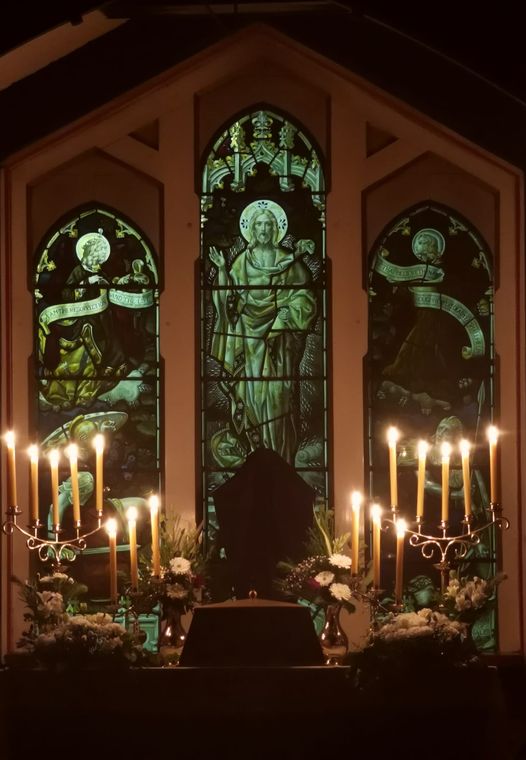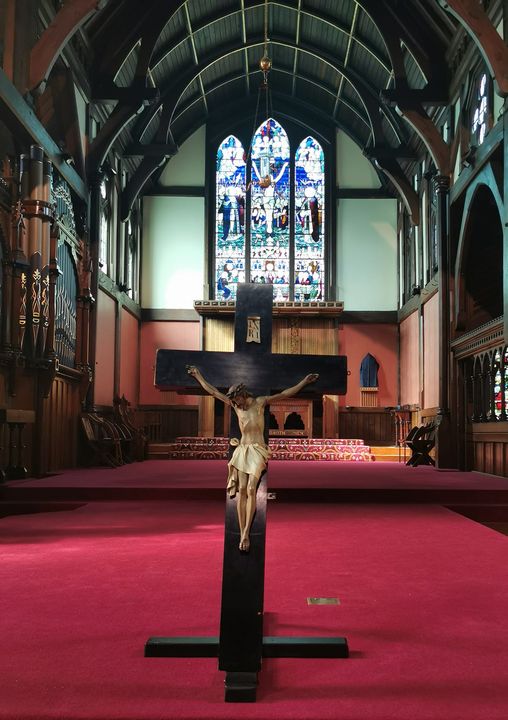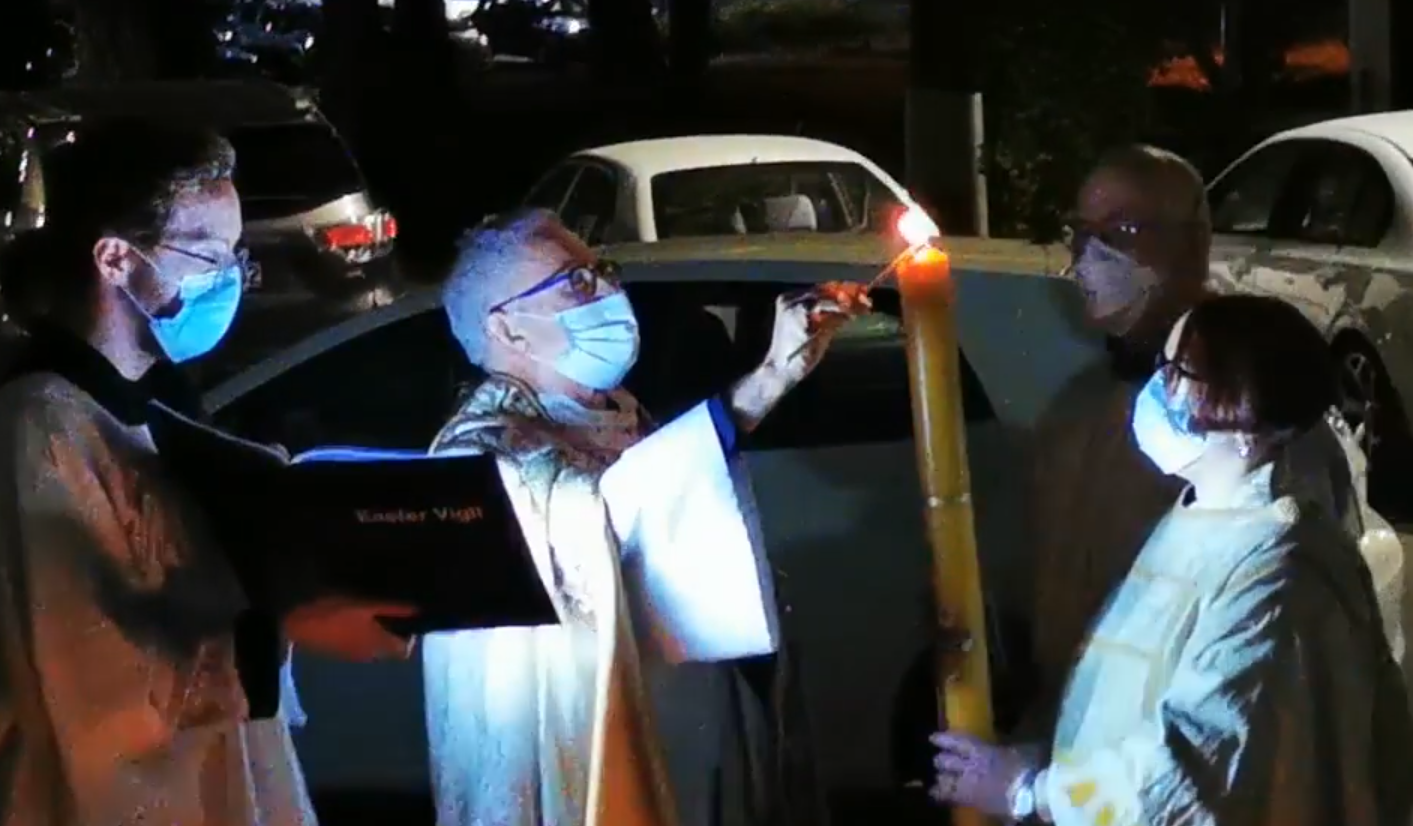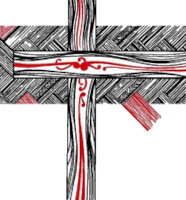This year we were blessed to be able to celebrate the Triduum together. As we journeyed through the most holy period of the Christian year, we heard sermons from Father Peter Beck, Mother Meg Harvey, and Bishop Peter Carrell. You can read them all here.
All photos are by Alistair Kinniburgh.
Maundy Thursday

Sermon delviered by Mother Meg Harvey
This week we have been preparing ourselves for the darkness and the light that is Easter, that starts tonight in humility and remembrance and service. We come together over the next 4 days to mourn and to celebrate as a community. Like millions of Christians around the world from tonight we mark with words and actions the final days of Jesus the Christ and we look to the hope his resurrection holds for us all. But I would suggest that we here in the world will experience Easter as we have never done before. I think this Easter will stand out in memory because we do not just sympathise, but indeed emphasise with Jesus in the darkness that lies ahead for him. In this changing, unstable, unpredictable COVID world we too have cried out, “My God, my God! Why have you forsaken me!” We too have grieved. We too have felt confusion and despair. We have had to find reserves of strength we did not know we had in us. This Easter what it is to struggle and to mourn is vividly and freshly engrained in us. To put ourselves in Jesus’ shoes this Easter is sadly much easier. Tonight we will strip the Church of all its embellishments and symbols and furniture. Many, if not all, of us have in the last months and years felt our lives and worlds striped down – locked down - too.
I think that this empathy we can feel for Jesus in the next few dark days is a wonderful gift. We are called as Christians to be forever building an intimate relationship with God as Father, Son and Holy Spirit. This Easter our intimacy with God is heightened in our ability to walk readily and deeply with his Son. I tentatively say to you to remember, from the last few years, your pain, to recognise your despair and to pour out your anguish because in these coming days to do so can only bring us closer to God.
I also say to you – well done true and faithful servants. Tonight’s readings are around the last supper. Exodus reminds us of what this Passover night meant for Jesus as a Jew, while Paul reminds us in first Corinthians that the centre and focal point of our liturgy and worship is grounded in Jesus’ actions at the last supper. But the Gospel reading from John reminds us of who Jesus called his disciples, and us, to be. It reminds us of the most basic fundamentals of our faith and of Christianity – to love one another and to serve each other.
So, I say again - well done true and faith servants. Well done. Because through the Lent and Easter we have once again risen up to be a community of faith together. Omicron has again reminded us of the preciousness of life and the way we live it. By and large in this city we have become a community who love one another and serve one another. We have looked out for each other. We have strengthened those in strife. We have physically and emotionally opened ourselves to being there for those in our community. Through humility, love and service we have seen new life emerge and made sure that hope will prevail.
In our darkest hours we have taken the light of Christ, heeded his command and gone out into our broken world to love one another and to serve one another. In our darkest hour we embraced the words of God to direct our hearts and minds and actions. We did not hide, we did not give up, we did not turn our backs on God and we did not deny who and what we are called to be as children of God, no matter how tiring or stressful that was.
As you reflect on the words of scripture tonight remember how well we have followed the teaching and commandment of Jesus. Feel blessed to be alive and to have lived through something that, if we choose, can bring us so much closer to our God. And hold on to what it has meant to be community in the past few years and what it has meant to love and serve our neighbour. Hold on because our dark days are not yet at an end.
There are still struggles ahead and our community still needs us. We have been blessed to be able to know truly what it is to serve and love our neighbour. We can hear of Jesus washing the disciples feet and hear his commandment to love one another as he loves us and know in our hearts what it means to enact that service and follow those words in our community here and now.
Many people are talking about what the church should be in the coming months and years. First and foremost in the coming months and years we must be what we are – Church. And at the simplest level Church is to love God, love each other and serve our world. As Bishop Peter said at this week’s Chrism service – we are to change the world, not manage the Church.
We have been true and faithful servants for whom the example of Jesus on this night has been a living reality. I pray that, with the coming hope of resurrection within us, we remain so.
Good Friday

Sermon delivered by Father Peter Beck.
Were you there when they crucified my Lord
Were you there when they crucified my Lord
Oh, sometimes it cause me to tremble, tremble, tremble
Were you there when they crucified my Lord
I’m finding it hard being here. I feel uncertain and unsure and a bit afraid. How am I going to stay and watch the inevitable? It may indeed cause me to tremble. So I pray… I make a slow sign of the cross… I take a deep breath… I am aware of all my multitude of feelings… Holy Spirit be with me as I draw closer to Jesus on the cross.
When the sixth hour came there was darkness over the whole land until the ninth hour. And at the ninth hour Jesus cried out in a loud voice, ‘Eloi, Eloi, lama sabachtani?’ which means, ‘My God, my God, why have you deserted me?’ When some of those who stood by heard this, they said, ‘Listen, he is calling on Elijah!’ Someone ran and soaked a sponge in vinegar and, putting it on a reed, gave it to him to drink saying, ‘Wait and see if Elijah will come to take him down’ . When Jesus had received the vinegar, he said, “it is finished”. And he gave a loud cry, bowed his head and gave up his spirit.
It is dark. The sun refuses to shine. The darkness.
I’m at the foot of the cross… I listen to Jesus’s words, ‘My God, my God, why have you deserted me?’, so foreign, yet so familiar. I can only imagine what he is going through as he cries out to his Father. How does it make me feel?
I want to help. Maybe I can wet his lips with the vinegar… What would I say to him? What would happen if our eyes met?
And then I hear his final cry. ‘It is finished’. He has given up his spirit. "It is finished."
Pilate pushed himself up from the judgment bench and sighed, “Jesus is finished, another political troublemaker out of the way.”
The priests looked at one another and said in hushed tones, “Jesus is finished. No more offense from him.”
The soldiers as they turned their backs and walked away: “Finished. It is over, our unpleasant but necessary work for the day.”
The crowds as they watched Jesus breathe his last and his head slump down, lifeless: “Finished. The spectacle is over.”
No. Not so! Jesus’ final words, “It is finished.” These are words of cosmic importance, words of universal significance… ‘It is finished’… Jesus’ last words. “It is finished” – his concluding declaration, his last words. They are the final punctuation on a sentence begun before the beginning of everything. They are words of completion, finality – “finished” –And I remember how it all began.
In the beginning was the Word, and the Word was with God, and the Word was God. He was in the beginning with God. All things were made through him. In him was life, and the life was the light of all people. The light shines in the darkness and the darkness did not overcome it… And the Word became flesh and dwelt among us, full of grace and truth. From his fullness, we have all received grace upon grace.
And so Jesus’ words, words of the Word incarnate, “it is finished.” It is the final punctuation on a sentence begun before all that is, before we were knit together in our mothers’ wombs, before the first light, first life, first spark, first dream, first bursting forth of creation.
The final punctuation on a sentence spoken in love, spoken across space, time, through ages, prophets, patriarchs, matriarchs, sages, and in these last days, spoken to us by a son: Jesus.
‘It is finished’. The final punctuation on a sentence spoken, lived in love; spoken, sung, breathed, in words like “And I, when I am lifted up, I will draw all to myself.” Words such as “Love one another as I have loved you.” Love, spoken in actions: touched and touching, taught and teaching, love reaching out, healing, embracing, lifting; calling “beloved” those called wrong, weak, small, outcast, other, sinner.
The Word incarnate spoke love in words, in deeds, spoke love in handing himself over, giving himself up, pouring himself out, until there is nothing left, nothing more needed, just one last breath, one last word. God’s sentence of love spoken across time, space, boundaries, on the cross – spoke its final syllables, in gasps, in an agonized whisper, in pain, yes, but with precision, point and power. This is no giving up, this is a declaration: “It is finished.”
O Jesus, to you, now lifted up, with your arms of love stretched out on the hard wood of the cross, in your loving and giving until all is completed, to you in your finishing, we bring all our incompleteness, all our unfinishedness, all those things done and left undone: our fractional loving, our fragmentary living, our unrealized intentions, our unfulfilled potential, our unarticulated praise, our unprayed prayers, our underachieved service, our ungiven forgiveness, our conditional charity, our inadequate hope, our wanting faith, unfinished us, unfinished me. And you say, drawing each of us and our incompleteness all to you, “It is finished.”
Were you there when the sun refused to shine?
Oh, it caused me to tremble, tremble.
Were you there when they crucified my Lord.
Easter Vigil

The Easter Vigil was particularly joyous due to the baptism of Hugh Munro and the confirmation of Hugh Munro and Eyob Habte Both were addressed in Bishop Peter's sermon, the notes for which are given below.
Notes for sermon delivered by Bishop Peter.
If Christ has not been raised, your faith is futile and you are still in your sins. (1 Cor 15:17)
Introduction
Our twelve verses from Luke’s Gospel are tantalising:
- The tomb that Jesus was laid in is discovered and rediscovered to be empty.
- Luke 24:3: “they did not find the body”; verse 5: “He is not here, but has risen.”
- Where is the disappeared Jesus? Where is the risen Jesus?
Main body
-
Of course we know, because we can read on through the remainder of Luke chapter 24, that various disciples encountered the risen Jesus, in experiences of seeing but not recognising the unexpected and surprising Jesus who turns out not to be dead but to be alive.
-
We also know, when we read what the apostle Paul has to say (himself someone who has encountered the risen Jesus), that the death and resurrection of Jesus are bound together in the first Christians’ understanding of the significance of Jesus for humanity:
-
In the Romans passage Paul sees the death and resurrection of Jesus intrinsic to the understanding of baptism:
- To be baptised was to identify with Jesus in his death and resurrection, perhaps symbolised by going down into the water of baptism like being buried and rising again out of water like being raised up from death.
- This identification, as Paul writes, is not about what happens with or in baptismal water, but in terms of God transforming our lives, from death to life:
- Romans 6:10-11: The death [Jesus] died, he died to sin, once for all; but the life he lives, he lives to God. So you also must consider yourselves dead to sin and alive to God in Christ Jesus.
-
And, wonderfully, this understanding of possibilities for transformation of the human situation, were prefigured in the ancient scriptures of Israel, our Old Testament, as we have heard this evening.
-
In HUGH’s baptism this evening, we affirm the reality of the resurrection of Jesus because we baptise people into the eternal, death-conquering life of Christ.
-
In HUGH and EYOB’s confirmation this evening, we confirm that the baptised life,
- with all its obligations to die to sin,
- to be alive to God in Christ Jesus,
- to love one another,
- and to serve the mission of God in the world
- is HUGH and EYOB’s public commitment;
-
And we pray that the Spirit of God will empower HUGH and EYOB for this committed life, with gifts and graces poured out on them.
-
But for all of us this evening,if we return in our minds to the tantalising Gospel reading in which the tomb is empty and the disciples have not yet met the risen Jesus:
- The resurrection of Jesus is not a teaching of the church, a concept of the theologians, let alone an historical debate about what really happened on that first Easter morning:
- The resurrection of Jesus is this: Jesus is alive today and we encounter him as the living Son of God:
- He is in our midst as we gather in his name and break bread together;
- He dwells within us and we live in Him;
- He speaks with us and we talk to Him:
- If we had time this evening each of us could talk about that encounter and each of our testimonies would be different, though united by all of us affirming that Jesus is alive.
Conclusion
- We live in especially challenging times: pandemic, war (and threats of worse), inflation, indifference if not hostility to being Christian.
- A special text for those baptised and confirmed tonight, and for us all, could be this:
And [Jesus] died for all, so that those who live might live no longer for themselves, but for him who died and was raised for them. (2 Corinthians 5:15)




